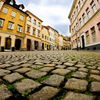How to Get Drunk in the UK - British Pub Etiquette
Lucy Corne
People often think that travel in Europe is easy; that cultural gaffes aren’t an issue and that the challenges of Africa or Latin America don’t apply. In some ways this is true, but even in the UK, where the language barrier is removed (save for a few unintelligible accents and some quirky vocabulary) it’s possible to offend the locals if you don’t swot up on essential etiquette. And if there’s one place you don’t want to upset a Brit it’s in their most cherished domain, the pub, so here are five crucial dos and don’ts for drinking in the UK.
The Golden Rule: Remember your Round
I once heard a story about a Canadian who was heading to London and was trying to budget his trip. He called a friend who’d just returned from a short UK adventure and asked the question that’s often used to gauge city costs: “How much is a pint of beer?” Sadly, the friend had no idea, not having bought a single pint on her 10-day vacation in Britain’s capital. “British people are so generous,” she beamed. They kept buying all my drinks.” Now I wouldn’t want to undermine the generosity of the average Londoner, but us Brits are not that welcoming! Here’s the deal: if you drink in a group in the UK, you’ll probably be expected to buy in rounds. This means that one person buys everyone in a group a drink and when people are reaching the bottom of their glass, someone else buys the drinks until everyone’s had a turn. It can work out to be a pricey night and is likely to get you pretty drunk as you’ll be committing to half a dozen pints, but opting out is no problem; just speak up before the first round is bought. Accepting rounds and not reciprocating will not go down well!
Don’t Wait for a Waiter
You can easily spot a Brit in Canada or the US: they insist on trying to order at the bar while servers attempt to usher them to a table. Likewise you can spot a North American in a British pub. By all means help yourself to a table as you enter, but if you fancy eating or drinking anything you’ll have to head to the bar to order. Of course, if you order some “pub grub”, your deliciously unhealthy meal will be delivered to your table, but rarely will anyone come to you to take your order. And unless you’re a regular customer with mobility issues, don’t expect anyone but your friends to bring your beers to your table.
To Tip or Not To Tip
It’s a common misconception in North America: British people don’t tip. It’s true that we tip less often and less generously than our counterparts across the pond, especially when it comes to drinking, but don’t risk upsetting your bartender by listening to rumours. Standard practise when buying a round in the UK is not to calculate 10 or 15% of the total, but to occasionally offer the barman or barmaid “one for yourself”. Don’t worry; they won’t take a cocktail or a double of the most expensive Scotch in the pub. Staff accrue beers throughout the night (or sometimes the cash alternative if no-one is looking) and either enjoy a pint after work or come back to drink them later in the week. Of course, tipping is welcomed and an instruction to “keep the change” will guarantee good service on your next round.
When to Complain about Warm Beer
The British reputation for drinking warm beer is only half-true and you should know which brews are served ice cold and which are quaffed at room temperature. Basically, any traditional ale is designed to be a little warmer than you might be used to, while lagers and pilsners should always be cold. Take care when you’re ordering as most pubs in the UK offer a variety of beer styles: ale, bitter, stout, lager. If you order the latter and it hasn’t been near a refrigerator you have every right to send it back, but if you want to try an ale (and you really should, at least once), there’ll be no refunds if it’s not icy cold. Speaking of complaints, Brits can be very picky (and perhaps a little stingy) where beer is concerned; don’t be surprised if you see someone asking for a top up if their pint is a little heavy on foam. And don’t be embarrassed to do the same!
Expect an Early Night
A night out in the UK starts early; sometimes as early as six or seven o’clock. If you want to find a seat or join in the institution that is the pub quiz, make sure you don’t leave it too late. Of course, if you start ordering pints at 6.30, you’ll be ready for bed before midnight, a good thing since most pubs close early too. Although 24-hour trading is now an option, many landlords stick to the traditional 11pm farewell. In quieter, more traditional pubs a last orders bell will warn you that the night is almost over and at 11 the bar staff abandon their post. They reappear 20 minutes later and if they’ve had a bad night they might take your half-full beer whether you’ve finished or not. By law you only have 20 minutes to finish your drink, so resist the temptation to order three or four at last orders.
Featured Articles
No-one likes to be cliché but when you're faced with planning a trip to Europe it can be tempting to follow the crowd.
The UK is known for many things: rain, a scandalous royal family, old buildings and bad food all spring to mind.
People often think that travel in Europe is easy; that cultural gaffes aren’t an issue and that the challenges of Africa or Latin America don’t apply.
Every year in August people get together to throw tomatoes at each other. I hate tomatoes, I think they are disgusting, so...
Free Backpacking Europe Planning & Essentials Guide
Download/More info on the Backpacking Planning and Essentials Guide
Featured Articles
No-one likes to be cliché but when you're faced with planning a trip to Europe it can be tempting to follow the crowd.
The UK is known for many things: rain, a scandalous royal family, old buildings and bad food all spring to mind.
People often think that travel in Europe is easy; that cultural gaffes aren’t an issue and that the challenges of Africa or Latin America don’t apply.
Every year in August people get together to throw tomatoes at each other. I hate tomatoes, I think they are disgusting, so...
Free Backpacking Europe Planning & Essentials Guide
Download/More info on the Backpacking Planning and Essentials Guide





